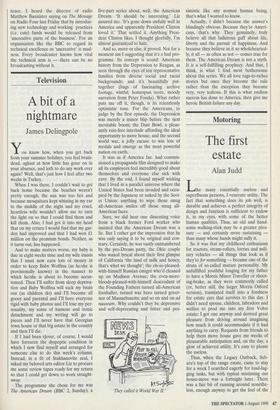Television
A bit of a nightmare
James Delingpole
You know how, when you get back from your summer holidays, you feel brain- dead, aghast at how little has gone on in your absence, and loth to do any work ever again? Well, that's just how I feel after two weeks in Turkey.
When I was there, I couldn't wait to get back home because the beaches weren't pretty enough, the sun was too hot and because mosquitoes kept whining in my ear in the middle of the night and my cruel, heartless wife wouldn't allow me to turn the light on so that I could find them and kill them. Also, I had got it into my head that on my return I would find that my gar- den had improved and that I had won million on the premium bonds. Neither, as it turns out, has happened.
And to make matters worse, my baby is due in eight weeks time and my wife insists that I must now earn lots of money in order to keep Baby Wolfina (as he/she is provisionally known) in the manner to which he/she is about to become accus- tomed. Then I'll suffer from sleep depriva- tion and Baby Wolfina will suck my brain out (as children do) and I'll become all gooey and parental and I'll bore everyone rigid with baby photos and I'll lose my per- sonality, my sense of humour and ironic detachment and my writing will go to pieces and I'll never have that Georgian town house or that big estate in the country and then I'll die.
If I had been clever, of course, I would have foreseen the dyspeptic condition in which I now find myself and arranged for someone else to do this week's column. Instead, in a fit of Stakhanovite zeal, I asked my beloved arts editor Liz to procure me some review tapes ready for my return so that I could get down to work straight- away.
The programme she chose for me was The American Dream (BBC 2, Sunday), a five-part series about, well, the American Dream. 'It should be interesting,' Liz assured me. 'It's gone down awfully well in America and apparently President Clinton loved it.' That settled it. Anything Presi- dent Clinton likes, I thought gleefully, I'm almost guaranteed to hate.
And so, more or else, it proved. Not for a moment am I suggesting that it's a bad pro- gramme. Its concept is sound: American history from the Depression to Reagan, as seen through the eyes of ten representative families from diverse social and racial backgrounds; and it's beautifully put- together (bags of fascinating archive footage, wistful, homespun score, moody narration from Peter Fonda). What rather puts me off it, though, is its relentlessly optimistic tone. For the Americans, to judge by the first episode, the Depression was merely a minor blip before the next inevitable boom; the Dust Bowl, a pleas- antly rain-free interlude affording the ideal opportunity to move house; and the second world war, a jolly excuse to win lots of medals and emerge as the most powerful nation on earth.
It was as if America Inc. had commis- sioned a propaganda film designed to make all its employees feel incredibly good about themselves and everyone else sick with envy. By the end, I found myself wishing that I lived in a parallel universe where the United States had been invaded and occu- pied by the Japanese or nuked by the Sovi- et Union: anything to wipe those smug all-American smiles off those smug all- American faces.
Sure, we did hear one dissenting voice from a black former Ford worker who insisted that the American Dream was a lie. But I rather got the impression that he was only saying it to be original and con- trary. Certainly, he was vastly outnumbered by the pro-Dream party, the Okie couple who waxed lyrical about their first glimpse of California 'the land of milk and honey, that's what we thought'; the oh-so-pleased- with-himself Russian émigré who'd cleaned up on Madison Avenue; the even-more- bloody-pleased-with-himself descendant of the Founding Fathers turned all-American footballer, turned war hero turned gover- nor of Massachusetts; and so on and on ad nauseam. Why couldn't they be depressive and self-deprecating and bitter and pes- 'They called it World War II.' simistic like any normal human being, that's what I wanted to know.
Actually, I didn't because the answer's blindingly obvious. Because they're Ameri- cans, that's why. They genuinely, truly believe all that ludicrous guff about life, liberty and the pursuit of happiness. And because they believe in it so wholehearted- ly, it all — as often as not — comes true for them. The American Dream is not a myth. It is a self-fulfilling prophecy. And that, I think, is what I find most bothersome about this series. We all love rags-to-riches stories but once they become the rule rather than the exception they become very, very tedious. If this is what endless success has done to America, then give me heroic British failure any day.


























































 Previous page
Previous page